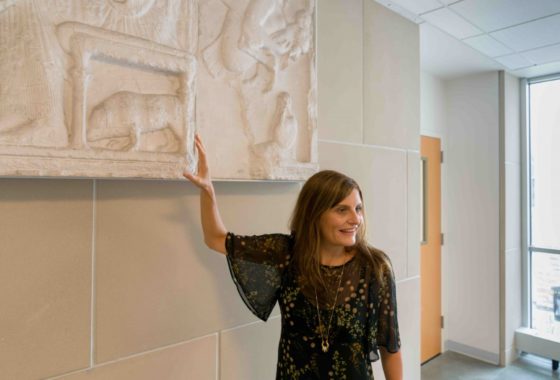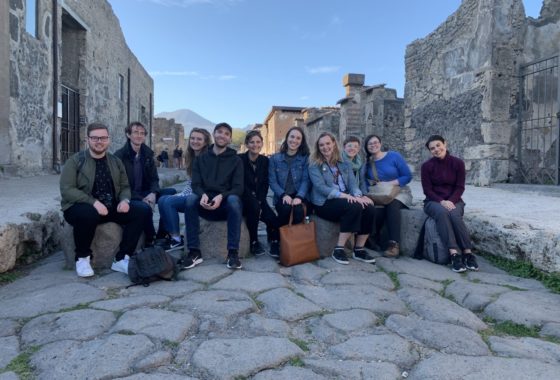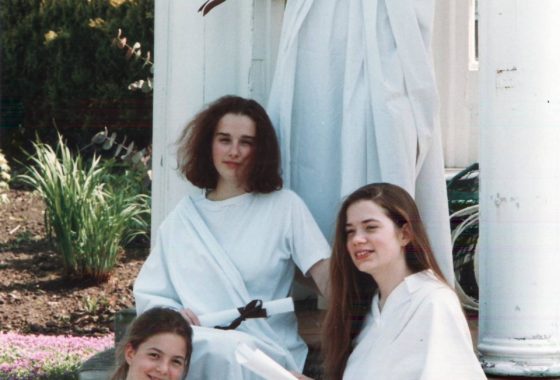Verity, who attended The Mount from 1988 to 1995 now works as a professor of Classics and History of Art at Cornell University in the USA. She currently chairs the Department of Classics and also curates the university’s plaster cast collection. After completing A-Levels, Verity read Classics (Literae Humaniores) at Christ Church, Oxford. She also studied at the Courtauld Institute of Art, London, taking an MA in Art History Christ Church, Oxford and DPhil in Classics.

What is the first thing that comes to mind when you think back to your years at The Mount?
My most vivid memories are of certain spaces in the school: the music practice rooms under the Dining Room; the swings in the garden; the warren of tiny rooms backstage in the Hall stuffed with mysterious costumes; the Common Room next to the fifth form Horse Boxes where we consumed huge amounts of toast!
What is your fondest memory of The Mount?
My fondest memory is also a space: the entrance to the library that was flanked by the offices of two wonderful teachers – Rosemary McEvoy, who taught us Latin so brilliantly and encouraged me to be a classicist, and Lydia Harris, who instilled in me a lifelong love of poetry (and chocolate!). I feel so fortunate to have experienced the intellectual generosity, kindness, and warmth of these remarkable women. As teachers, scholars, and mentors, they continue to inspire me every day.
How important an influence has the Quaker ethos been to you?
I was lucky to be brought up in a Quaker household so the Quaker ethos and way of life were very familiar and deeply comforting to me throughout my time at The Mount. George Fox’s words, “Walk cheerfully over the world, answering that of God in everyone”, have been a guiding principle throughout my life, especially as my career has taken me to many different countries (including the USA, which has its own rich history of Quakerism). Those words are more vital than ever as we face the many crises and deep divisions that challenge us today, and they give me courage in my work as an educator. Amidst the daily demands of teaching, scholarship, and parenting, it can be difficult to access that “still, small voice in the depths of my being”, but knowing it is there is a great source of strength and inner peace.
What influences from your time at The Mount helped you through your studies?
The influences were many and profound! When I first arrived at Oxford it was easy to feel intimidated, but having boarded for seven years I found the transition to living away from home relatively straightforward. The Mount did a wonderful job of cultivating independence in both work and social life. During my first week at college, I found that all the books we needed for our first essay assignment had already been checked out of the library, but rather than being daunted I took this as an opportunity to do my own research and read more challenging and innovative material. I had been instilled with a sense of curiosity and self-motivation that really paid off when it came to the more self-directed nature of study at university, which led in turn to a lifelong commitment to academic research. I especially appreciated The Mount’s encouragement of an open-minded attitude to all religions. In fourth year, we were sent each Sunday to different kinds of church service across York; this experience inspired a fascination with the relationship between culture and religion and ultimately led to my PhD dissertation, on Art and Epiphany in Ancient Greece.
Can you describe a moment in your career in which you felt connected to your Mount education?
I feel connected to it daily in that I am now a teacher myself, albeit at the university level. Through my own experiences in the classroom, I now appreciate how extraordinarily privileged I was to have been taught so well! As a professor and a parent (of twin boys), I hope to pass on to my own students the senses of both wonder and responsibility that were instilled in me at school. My A-Levels in Latin, Classical Civilization and English helped me to develop skills in critical analysis that I use every day, while our Latin trip to the Bay of Naples inspired a passion for classical art history that ultimately became a career.


Are you still in touch with your school cohort?
One of the toughest things about living overseas (especially during a global pandemic) is missing friends and family, so thank goodness for text messaging and social media! I am longing to see my friends again, but at least I feel connected to their lives in more virtual ways. It is amazing to see how the bonds of care, goodwill and affection we forged together have stayed so strong over the years, despite the frightening number of plates we are all spinning
Looking ahead, what are your hopes for your future?
This is a complicated time to be a classicist, and a lot of my work at the moment wrestles with the difficult legacy of a subject that is fundamentally associated with elite status and white privilege. I hope that I can help make Classics more accessible, diverse, and attentive to inequalities both ancient and modern. More personally, I am desperate to be able to travel again – to see my family in England (especially my sister and fellow Mountie, Belinda), and to spend some quality time in Rome!
Any final thoughts?
I will be ever grateful for the opportunity that the Mount gave me to take part in Friends’ Schools choral concerts (despite my embarrassingly bad singing skills!). Singing Fauré’s Requiem in York Minister was a once-in-a-lifetime opportunity that I shall always treasure.
